Imagine 400 oil wells along the shores of one of the biggest lakes in Africa, Lake Albert. Imagine, too, that some of these wells are located in the largest and most beautiful natural park in Uganda, an area known for its dizzying waterfalls and its hippopotamuses.
Then visualise an oil pipeline 1,443 kilometres or 896 miles long – the distance between Paris and Rome – running along the edge of Lake Victoria, the largest lake on the continent and the source of the River Nile. This underground pipe will carry oil heated permanently to 50°C to keep it fluid and will go as far as the port of Tanga in Tanzania, from where the oil will be loaded onto massive tankers.
These major projects are currently being developed by TotalEnergies - the new name for French multinational oil giant Total – which is planning to start oil production within three-and-a-half years.
Total owns 56.6% of the new 'Tilenga' oilfield in the west of the country where the new wells will be drilled; the name was inspired by two local names for the kob antelope. Its partners in the project are the Chinois China National Offshore Oil Corporation (CNOOC) and the Uganda National Oil Company (UNOC), the latter operated by the Ugandan government. Total will be investing an estimated 8.2 billion dollars in the development of these oil wells and the construction of the giant pipeline, which is called the East African Crude Oil Pipeline, or EACOP.
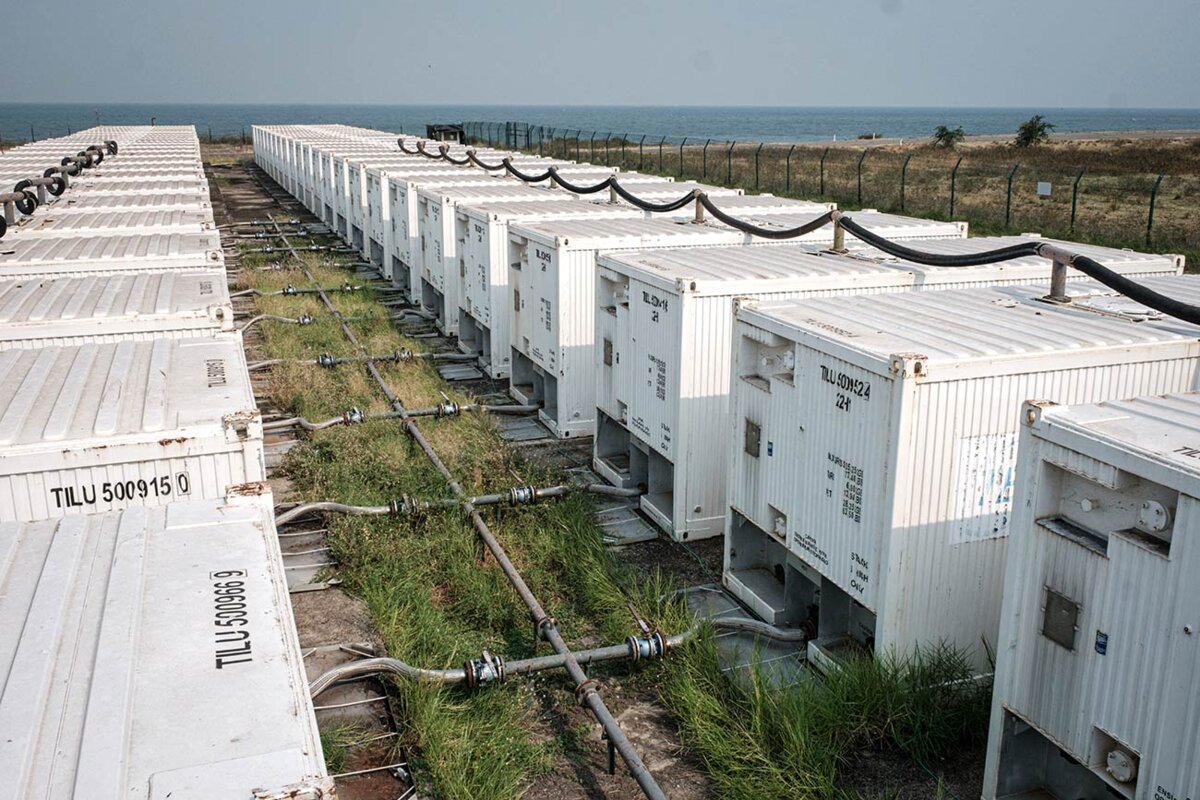
Enlargement : Illustration 1

On Tuesday September 28th the multinational presented its plans and strategy at an 'investor day' in Paris. Speaking at the event, TotalEnergies' chief executive Patrick Pouyanne, said it was still waiting for the parliaments of Uganda and Tanzania to pass a total of five bills to enable the scheme to go ahead.
“We have given conditional awards to all the contractors so we can execute when the paperwork is done. We have finalised land acquisition for upstream facilities and are on the way to do it for the pipeline,” said Mr Pouyanne, who added that the respective parliaments were expected to pass these bills into law by the end of 2021.
If the scheme does go ahead, close to a billion barrels of oil could be extracted from the Tilenga oilfield in all. Yet this unprecedented scale of production would be diametrically opposed to existing international recommendations and current scientific knowledge concerning the climate.
During the Paris climate accord reached in 2015 countries committed to limiting global warming to “well below” 2°C and if possible to 1.5°C compared with the pre-industrial era. To maintain any chance of reaching this objective, close to 60% of existing oil and gas reserves will have to stay in the ground between now and 2050, according to a study which appeared this September in the science journal Nature.
The International Energy Agency, which has historically backed energy producers, now recommends the stopping of exploration at new oil sites “beyond those projects already committed as of 2021” in its pathway to a “net zero energy system by 2050”.
In response, the French multinational insists that the development of the Tilenga oilfield and the EACOP pipeline fits in with its strategy of favouring those operations whose economic “break-even point” is low. The group believes that on this project the break-even point will be around 50 dollars a barrel, compared with the current price of 80 dollars. It also thinks the extraction of this oil would be “efficient in terms of greenhouse gas emissions” at around 13kg of CO2 a barrel, compared with an average of 20kg of CO2 a barrel in its current production operations.
Nonetheless, six French and Ugandan non-governmental organisations lodged a formal complaint against TotalEnergies in October 2019, under French legislation that requires large companies to exercise a duty of 'vigilance' over their actions. More than 30,000 people are expected to be displaced to make way for the drilling at Tilenga. And tens of thousands of other inhabitants will also lose access to and use of their lands because of the construction of the huge pipelines, according to NGOs such as Amis de la Terre et Survie and the Fédération internationale pour les droits humains.
Indeed, their reports suggest that more 100,000 people in Uganda and Tanzania have already suffered violations of their rights, including property rights, harm to their ability to make a living, worsening living conditions, and problems with access to healthcare and schools.
We never make public letters exchanged between the head of state and his counterparts.
And yet, very discreetly, the Élysée has been supporting and encouraging these projects. After Yoweri Museveni was re-elected for a sixth term as president of Uganda in January 2021, Emmanuel Macron sent him a letter of congratulation. This letter should have remained confidential. As the Élysée told Mediapart: “We never make public letters exchanged between the head of state and his counterparts.”
But the East African country's official state communications body, the Uganda Media Centre, published extracts of the letter in a statement issued on May 1st 2021 (see below).
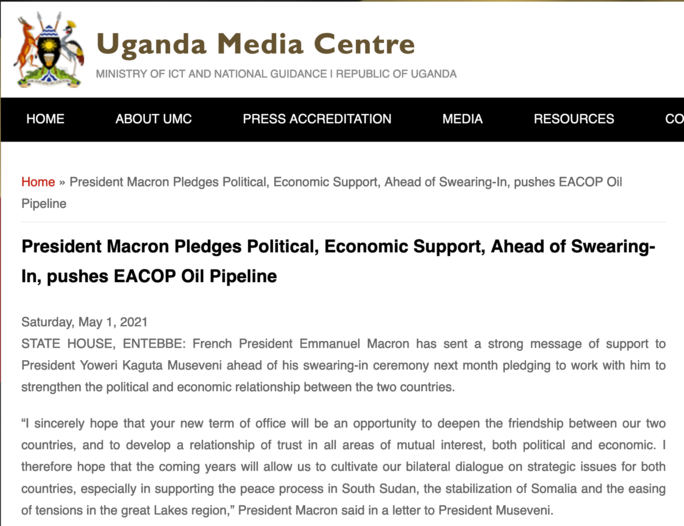
Enlargement : Illustration 2

Though it was overlooked by the French media, the statement was picked up by several newspapers in Uganda itself. President Macron's letter states that the signing of the final investment decision between Uganda, Tanzania and Total about the EACOP pipeline “which will allow the exploitation and export of oil …. will be a major opportunity to intensify trade between our two countries and to further expand our cooperation”. The French president adds: “You can count on me to mobilize French expertise and investors to increase the French economic presence in Uganda ...”
Questioned by Mediapart about the origin of this letter, the Uganda Media Centre confirmed that these quotations were “extracts from a letter of congratulation that President Macron sent in May to President Museveni, after his re-election”.
This meant that the Élysée was obliged to acknowledge the authenticity of the letter. “It concerns an important investment project what involves a French company. As such it was mentioned in high-level exchanges with the Ugandan authorities,” the Élysée told Mediapart.
Meanwhile, at the end of this month the minister for overseas trade Franck Riester is due to visit the English-speaking countries of East Africa: Tanzania, Kenya, Uganda and Rwanda. “The minister's trip has nothing to do with the project that's mentioned,” insists his private office, who instead emphasise projects concerning sustainable cities in Kenya, and the importance of supporting small and medium-sized businesses. Yet in his letter to the Ugandan president Emmanuel Macron announces the future visit by his minister “in line with our mutual desire to intensify our partnership”.
In a statement TotalEnergies insisted: “We have no knowledge of a letter from President Macron to President Museveni specifically concerning the timetable of the carrying out of the EACOP project.” Was the group planning to ask for financial aid from the French public investment organisation the Banque Publique d’Investissement (BPI) to get export loans or loan guarantees? “No, there are no plans to ask for the support of export guarantees from France, because there are few French businesses taking part in the construction of the project,” said the multinational. It said that the project was “being undertaken by TotalEnergies without the intervention of the French state”.
The French Ministry of the Economy responded along similar lines and told Mediapart: “The Ministry of the Economy is not examining ways to help this project.” The Élysée, too, said that apart from the letter to President Museveni: “There haven't been any other forms of support.”
Yet there are links between the French public sector and TotalEnergies. Business France, the state agency that helps French companies with their exports, gave information in its July 2021 newsletter on “African projects” about an engineering contract awarded to an international consortium in relation to the Tilenga project.
And in the first quarter of 2021 Proparco, the subsidiary of the French development agency Agence Française de Développement (AFD) which helps the private sector, published in its magazine a long article on “Total's approach in response to biodiversity issues”. It was written by the oil group's biodiversity expert inside its environmental department and by its director of environmental and social issues. It refers to the Tilenga project and the “net gains in biodiversity” that they say will result from the oil projects in Uganda.
Above all, in the Ugandan capital Kampala the French embassy has gone out of its way to support TotalEnergies. The Twitter threads of both the embassy and the ambassador, Jules-Armand Aniambossou, are testament to this.
On September 29th 2020 the ambassador Tweeted: “We are very proud that Total, a French company, is part of the Oil and Mining Sector in Uganda.”
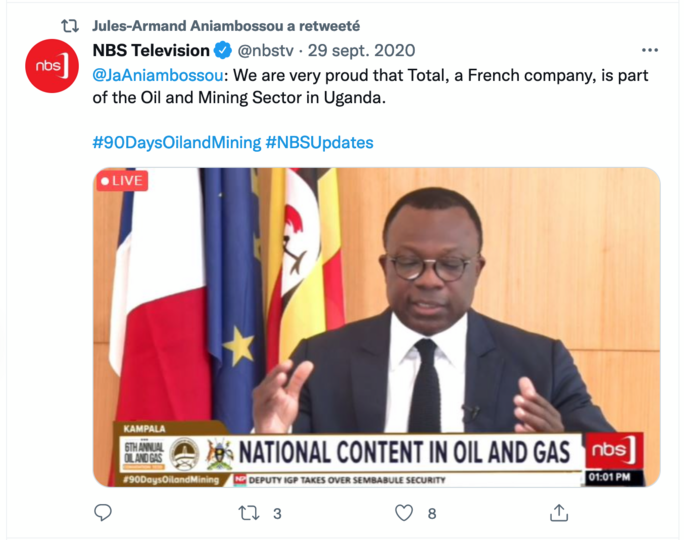
Enlargement : Illustration 3

The ambassador was talking as part of the “90 day oil and mining” media campaign run by a lobby group and sponsored by Total, among others. That same day Jules-Armand Aniambossou “reaffirm[ed] France's commitment to accompany Uganda in the development of the oil and gas sector”. This message was sent out by the embassy's Twitter account, along with a photo of the ambassador himself, and was addressed to Total's branch in Uganda (see below).
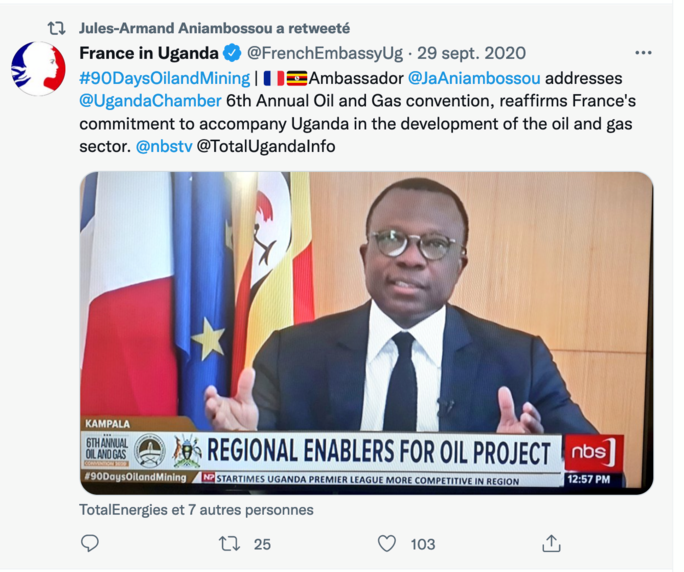
Enlargement : Illustration 4

A few days earlier Jules-Armand Aniambossou had re-tweeted from his personal account a message from TotalEnergies announcing the reaching of an agreement with the Ugandan public company UNOC in the oilfields at Lake Albert, as well as over the governance of the future pipeline.
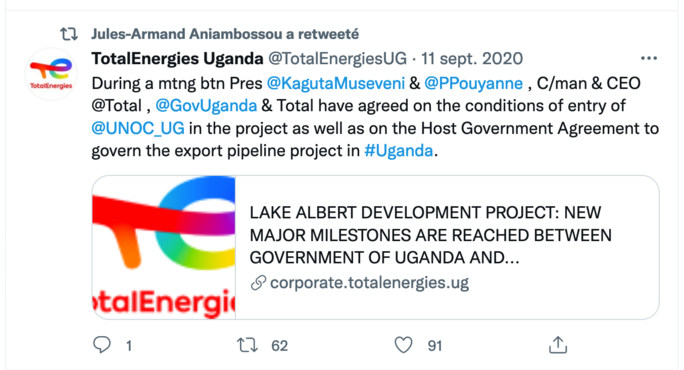
Enlargement : Illustration 5

Almost a year later, on August 23rd 2021, the French embassy in Kampala organised a farewell reception in honour of Total's director in Uganda, Pierre Jessua, when he left his post in the country. A Tweet by the French embassy, re-tweeted by the ambassador himself, declared “farewell to Pierre” and “welcome Philippe”, a reference to Pierre Jessua's successor, Philippe Groueix. The hashtag used was: “TotalEnergies”.
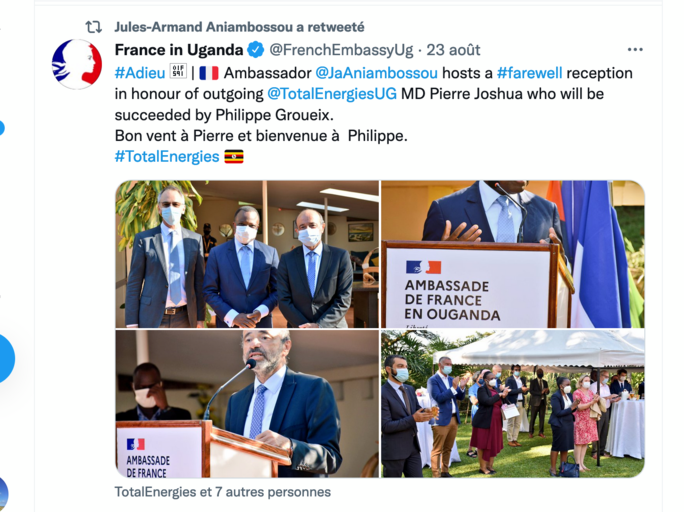
Enlargement : Illustration 6

The ambassador's residence in Kampala also regularly hosts the “Kampala business club” for meals or cocktail receptions. One guest spoken to by Mediapart and who asked not to be named, described a networking evening in 2020 with lawyers and business people in the presence of Total's former director general.
Posted to Uganda in July 2019, Jules-Armand Aniambossou is no ordinary ambassador. He studied in the same year as Emmanuel Macron at the elite École Nationale d'Administration (ÉNA) college, graduating in 2004. Up to June 2019 he had been the coordinator for the Presidential Council for Africa, an informal circle of Frenchmen and women of African origin which purports to bring together civil societies from the continent and which was founded by Emmanuel Macron in August 2017. In his book 'Le Piège africain de Macron' ('Macron's African trap'), author Antoine Glaser describes its members as the “leaders (entrepreneurs, bankers, professors, journalists) not really representative of the African diasporas from the suburbs”. Glaser says that Aniambossou is “very close” to the president and was “parachuted onto the continent” into a “strategic country [in terms of] diplomatic influence that is outside the French sphere”.
But is it really the role of an ambassador to support the TotalEnergies group in an oil project that is as dangerous as this one is for the climate and for human rights? Contacted by email the ambassador did not reply to Mediapart's question on this. A diplomatic source explained that “this economic project is being carried out in Uganda by a private company which is under a legal obligation to show vigilance. In addition, France has reiterated its commitment, everywhere in the world, to respect for human rights and to the pressing need to protect the environment”.
The support for Total from the French embassy in Kampala predates the appointment of Jules-Armand Aniambossou. His predecessor, Stéphanie Rivoal, organised several gatherings directly sponsored by Total. In 2019 an event to mark the release of that year's Beaujolais nouveau wine attracted 800 guests – diplomats, expatriates, business leaders, employees and so on. When the ambassador introduced the event from a rostrum there was a large Total logo on a screen behind her (see below).
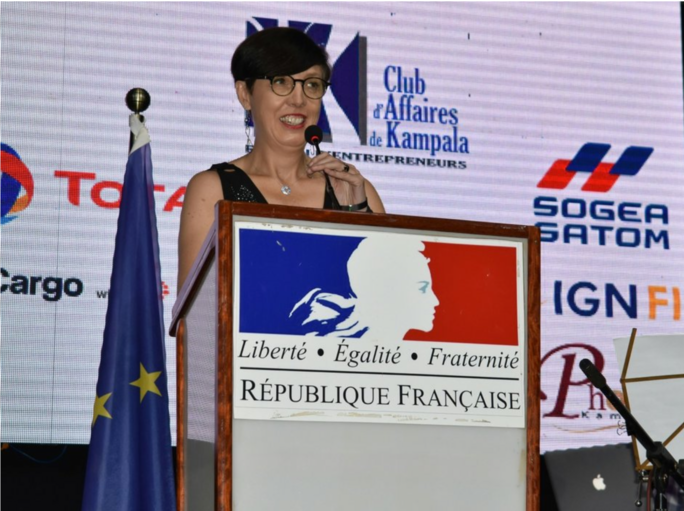
Enlargement : Illustration 7

On Bastille Day in July 2017, just weeks after the election of Emmanuel Macron, Stéphanie Rivoal organised a large musical ball on the theme of 1936 and “Social (R)evolution”. The main sponsor was Total whose logo was reproduced twice above other leading company brand names such as Bolloré logistics, Stanbic bank, the cement firm Hima and car maker Renault (see invitation below). Contacted by email, Stéphanie Rivoal did not respond to Mediapart.

Enlargement : Illustration 8

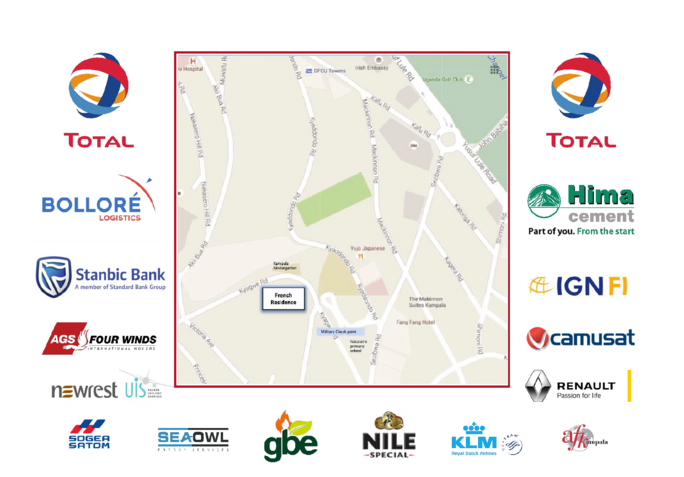
Enlargement : Illustration 9

In 2021 the oil group again sponsored a series of cultural events, this time organised by the French public language and cultural body Alliance Française; these included hip-hop lessons, a graffiti mural and and workshops on creating videos and music soundtracks.
In May 2021 Hilda Flavia Nakabuye, a young activist from the Fridays for Future movement – the school climate strikes launched by Greta Thunberg – wrote a letter to Emmanuel Macron and TotalEnergies' chief executive Patrick Pouyanne. In it she says: “We Ugandans aspire to develop but not at the expense of our lives. We are tired of having sleepless nights worrying about what the next flood will bring or stop. Mr Pouyanne you are 57. I hope to live as long as you. That's why I'm fighting for my present and for my future.” In her view, faced with climate change and the risk from oil pollution, that future is “more than uncertain”.
----------------------------------------------------------------------
- The original French version of this article can be found here.
English version by Michael Streeter


